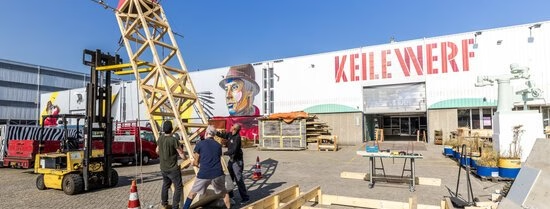Makerspaces - places where people with interests in crafts, technology, design, and product development work on projects while sharing ideas, equipment, and knowledge. These spaces have the potential to be ecologically and socially sustainable. At the same time, they are often seen as hubs for innovation and entrepreneurship that can contribute to reproduction of existing economies. In her paper, researcher Olga Vincent suggests looking at makerspaces through the lens of diverse economies and identifying their potential to transform rather than conform to dominant economic structures. Olga Vincent looks at the Keilewerf, a makerspace in Rotterdam, as a case study.
Commercial and hybrid makerspaces offer room for craftspeople who want to earn a living with their work. Local authorities, as well as some researchers, see makerspaces as hubs for entrepreneurship, placing an emphasis on the role of makers in local and regional economic growth. Whereas this view could be worthwhile, if we consider the potential of makerspaces to create jobs and pay taxes, it might overlook a complex reality of makerspaces that can also be seen as hubs of thinking, doing, and organising that is alternative to capitalist values and practices. Using the Keilewerf as a case study, Olga Vincent analyses how capitalist production co-exists with alternative ways of thinking and doing.
Keilewerf: hub for diverse views on social and/or environmental sustainability
The Keilewerf in Rotterdam is a rather unique space where makers with different specialisations work next to each other and with each other. The makerspace lives and breathes diversity, being situated in the most culturally diverse city in the Netherlands.

“Colourful workshops and studios built by the makers from scratch are all around you once you enter the Keilewerf in Rotterdam. However, the diversity also extends beyond that: the Keilewerf is home to professionals and amateurs, to private firms, non-profit foundations, and social enterprises,” Olga Vincent explains. “A place like the Keilewerf was the perfect case study for my research.”
Olga Vincent interviewed both management and makers, who focus on at least some aspect of social and/or environmental sustainability. In order to understand the Keilewerf as a makerspace in its entirety, Olga Vincent also incorporated Het Keilewerf Boek in her analysis, a book with an overview of all Keilewerf makers, issued in honour of the fifth anniversary of the Keilewerf.

Unexpected findings?
While conducting interviews with the makers, Olga Vincent was surprised to see how often capitalist, alternative, and non-capitalist practices co-exist. For instance, market transactions (so usual money-commodity exchange) are combined with gift-giving or barter; private property is combined with shared assets (such as knowledge or tools) or even free resources (such as waste materials that can be upcycled). Olga Vincent sees that private property and private firms, the typical ‘capitalist’ type of ownership, play an instrumental role in the respondents’ enactment of alternative value, such as nurturing relationships with community, free knowledge exchange, focus on quality rather than quantity etc.
Tensions between capitalist and alternative practices are also visible. For example, makers often experience pressure to expand production, or showcase contribution to the formal economy by producing and selling more. Some of the interviewees were very intentional to not give in to these pressures and stay small.
Another interesting finding is that capitalist market structure creates serious constraints for makers through, for instance, restricted access to lending from the banks, limited information on how to organise an upcycling/sustainable business, or lack of policies that support such businesses (e.g. no tax on negative externalities). Constrains like these sometimes undermine valuable aspects of the space, such as the community aspect. It would be interesting to consider how ‘capitalist’ pressures can be kept at bay to allow alternative spaces to flourish.
“I think it is important to emphasize that makers don’t frame their activities as being alternative or non-capitalist. This is a distinction I make with the help of a theoretical framework that I use in the paper. I think this distinction is helpful for several reasons. It might lead to more makers being intentional with their practices by reflecting on how making practices can be positioned within a spectrum ranging from reinforcing capitalist growth-oriented economies or as creating alternative realities,” Olga Vincent states.
“As a society, we might want to have more conversations on what type of local businesses we want to support through purchasing decisions and through economic policies.”
Olga Vincent contributes to a wider debate on what type of economies we want to create with her paper. Multiple views on macro frameworks that question economic growth as an objective come to light. Olga Vincent suggests that on a micro perspective, experiences of makers can provide us with valuable insights on redesigning economies. Moreover, a deeper understanding of tensions and complementarities between capitalist and beyond capitalist modes could answer an important question: how can a transition to a sustainable economy become feasible and desirable?
- Researcher
- More information

